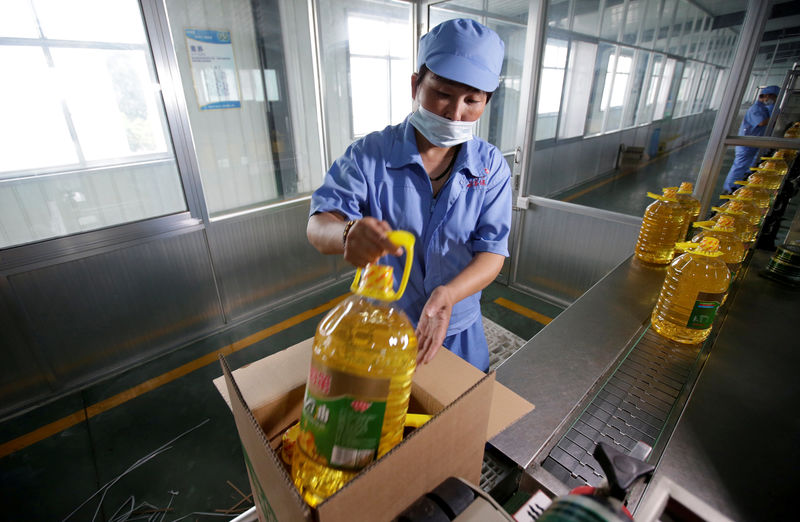By Engen Tham
SHANGHAI (Reuters) - As U.S. and Chinese firms rush for outside expertise on how to handle fallout from the escalating trade war between the two nations, consultants on everything from management to logistics say they have seen soaring demand for their services.
Washington and Beijing have been locked in a tit-for-tat trade battle, with both sides slapping steep tariffs on each other's goods in a fight that has sparked dire warnings of economic doom and gloom.
With companies hit hardest by the tariffs such as soybean producers and auto manufacturers grappling to relieve pain from the conflict, consultancies on international trade have been cashing in.
Firms like Deringer in the United States and ETCN in China say they have been giving advice to clients ranging from which countries to turn to for alternative sources of supply to how to legally re-classify products to avoid tariffs.
"Our value has never been higher ... when I talk to people, they are desperate for the expertise," said Robert Stein, vice president of Mohawk Global Trade Advisors in the United States.
He added that the company, which provides international trade consultancy services from offices in five U.S. states, has seen a 20-percent jump in consulting activity since the trade war began heating up, around the first quarter of this year.
Amy Magnus, director of customs affairs and compliance at Deringer, said her firm had seen increasing appetite for its consulting services, with particular interest in so-called tariff engineering - structuring the production process to legally sidestep tariffs.
"A company might import components, partially assembled product, or change the final product in a way that changes the classification of the good to a new product - one that is not subject to the tariff," said Magnus.
Deringer says on its website that it is the largest privately held customs broker in North America.
U.S. imports from China that will be most affected by tariffs include cell phones, telecommunications equipment, toys and sporting equipment, while U.S. exports to China that will be hit include civil aircraft, plane engines, cars and soybeans.
IT GETS KNOCKED DOWN?
One medium-sized U.S. gardening equipment supplier which has just hired a logistics expert is considering "complete knock-downs" for products that may be affected by tariffs, said a person with direct knowledge of the matter.
That would mean products sold by the firm that are usually made in China would instead be shipped to the United States as individual components before being assembled there, thus avoiding tariffs on the finished items, he said.
The source declined to be identified as he was not authorized to speak to media and did not want the company to be named due to the sensitivity of the matter.
Meanwhile, Chinese import and export consultancy ETCN in the first-half of 2018 saw a 40 percent on-year increase in U.S. users of its website, which sets out compliance and customs information.
The firm charges different rates for services ranging from access to real-time tariff information and trade data to an online database of company trade histories.
Its U.S.-registered members doubled in April from a year before, the company told Reuters.
Supplier sourcing is also a hot topic, with companies potentially shifting to buy raw materials or components from nations not subject to tariffs.
"U.S. companies that have China based supply chains are exploring how they might incorporate other countries like Vietnam or Thailand into their network of vendors," said Richard Morgan, chief executive of business advisory Equus Global Associates, which has seen an increase in billable hours as existing clients evaluate the impact of tariffs.
Consultancies in other countries are also seeing the knock-on effect of growing global trade tensions, especially across the U.S. border in Canada.
"People are confused. People are ... not panicking, but we are definitely seeing an increase in (tariff) enquiries," said Igor Chigrin, co-founder of small Canadian import and export consultancy Win Global Partners.
He said the firm had seen a 15 percent increase in business since trade tensions started to intensify, and expects another 50 percent jump over the second-half of the year.
GETTING BIG
Anticipating an influx of work in the next couple of months, some consultants have been considering expansion.
Mohawk Global may grow its so-called 'duty drawback' department as a result of the recent spike in business. Duty drawback allows for the recovery of duty on goods that are imported to the United States before being exported.
But advisory firms are aware that their boom times are precariously balanced on the back of political sentiment.

"To be very frank, he (U.S. President Donald Trump) could tweet and an hour from now things would change," said Stein at Mohawk.